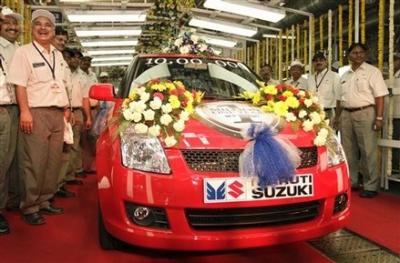According to a 2009 report released by the Japanese embassy, there are 71 Japanese companies operating in the Indian automobile sector. This includes companies that manufacture cars, but also extends to companies that manufacture automobile components.
What is the business strategy of Japanese automobile companies operating in India?
The general strategy of Japanese companies operating abroad is based on two pillars: enhancing international competitiveness, and stimulating the economy of the host country. The overall objective is to ensure that a virtuous circle of innovation and demand is in place. This approach entails developing policies in the areas of human resources, production means and infrastructure, finance, and capability. This approach is the base strategy for Japanese automobile companies operating in India.
In more detailed terms, for Japanese automobile companies, India is a production base, a stable investment target, and a strong consumption market. For Japanese automobile companies operating in India, then, rapid Indian economic growth is vital. The Indian economy must continue to grow for the production, investment and consumption of Japanese automobiles to benefit.
How, then, has investment by Japanese automobile companies helped to drive both Indian and Japanese economic growth? Dealing first with India, investment by Japanese automobile companies in the Indian economy has produced an intimate relationship between parts industries and subcontractors. Japanese assembly makers generally rely heavily on local Indian parts makers and subcontractors, and Japanese companies that produce automobiles buy and assemble their parts from local producers. To maintain high quality and high productivity in the final product, Japanese companies utilize the same quality control systems and highly organized delivery systems with subcontractors. The resulting successful transfer of technology has improved the technology used by local Indian industries, enabling Indian companies to attain a competitive advantage.
As for Japan, collaboration has enabled Japanese automobile companies to establish a strong sales and services network in India, allowing these companies to better serve their customers. Further, by investing in India, Japanese autmobile companies have ensured an efficient supply chain of dealers, ancillaries and vendors, saving costs and improving their bottom line.
How have Japanese automobile companies sought to invest in the Indian market?
The majority of the Japanese companies entering India have done so through a strategic partnership with an Indian company that has enabled them to effectively understand the Indian market. At the same time, Japanese companies have ensured that their management practices are also followed in their Indian operations. Thus, when Suzuki entered India through a joint venture with Maruti, it ensured that practices such as team work, imparting multiple skills to operators, flat hierarchy, bottom-up innovation, and in line quality assurance processes, were replicated in its Indian operations.
What is the future for Japanese automobile companies in India?
The focus of Japanese automobile companies in India has shifted from new product development to process optimization and cost reduction. In addition, greater cooperation is being sought with Indian workers and management, primarily through Japanese collaboration with local supplier industries. More specifically, in order to reduce the import cost of components and accessories, many companies are planning to localize component sourcing to a greater extent. Suzuki has already achieved over 90 per cent localization for Maruti 800, Zen and Alto cars.
India has the potential to become one of the world’s leading consumer markets. In addition, industry analysis shows that India is an attractive base from which to export cars to third country markets. Exporting cars from India to the world market is 35 per cent cheaper than Europe. Thus, as long as the Indian economy continues to grow, Japanese automobile companies will continue to both sell and export cars in India.
One cautionary note remains. While manufacturing in India is cost effective, manufacturing in China remains 12 to 15 per cent cheaper.
Strong Indian economic momentum is a major force driving Japanese automobile companies’ aggressive future plans. Most Japanese automobile companies are planning to expand their production capacity, increase product portfolio, target new consumer segments and increase their Indian market share.
As long as the Indian economy continues to grow, investment by Japanese automobile companies in India will be a win-win situation for both India and Japan.
Nabeel Mancheri is a research scholar at the Centre for East Asian Studies, Jawaharlal Nehru University, New Delhi.


Dear Mancheri, dear Nehru,
in the light of the recent strikes in China, will production remain “12 to 15 per cent cheaper” in China? What is is that makes manufacturing cheaper in China? Is it the wages, after all?
I ardently hope, of course, that workers in India are treated better than in China. I think the governments of industrialized countries need to enforce better labor rights in their companies abroad.
Thanks for your time in advance
Tayo Takada